Analysis of Recovery-Focused Mental Health Care Practice Assignment
VerifiedAdded on 2023/01/19
|8
|1685
|69
Practical Assignment
AI Summary
This assignment focuses on recovery-focused mental health care practice, emphasizing patient-centered approaches to treatment and well-being. The student designed a creative piece, a fishbone diagram, to visually represent the key elements of recovery-oriented mental health nursing. The assignment then discusses this creative work, outlining its purpose and rationale, and connects it to the promotion of recovery-focused nursing practice using evidence from relevant literature. The student explores the importance of self-care, hope, resilience, and societal support in achieving meaningful lives for individuals with mental health issues. The discussion highlights the collaborative nature of recovery, involving healthcare professionals, patients, families, and the community, and its integration into mental health policies. The assignment underscores the significance of patient experience, autonomy, and positive risk-taking in promoting a recovery-focused culture. The creative piece demonstrates the need for a shift in focus from illness to individual experience and the importance of respect, dignity, and maximizing an individual's determination in the recovery process. The assignment concludes by emphasizing the potential of recovery-focused practices to improve mental health care and foster innovation in the field.
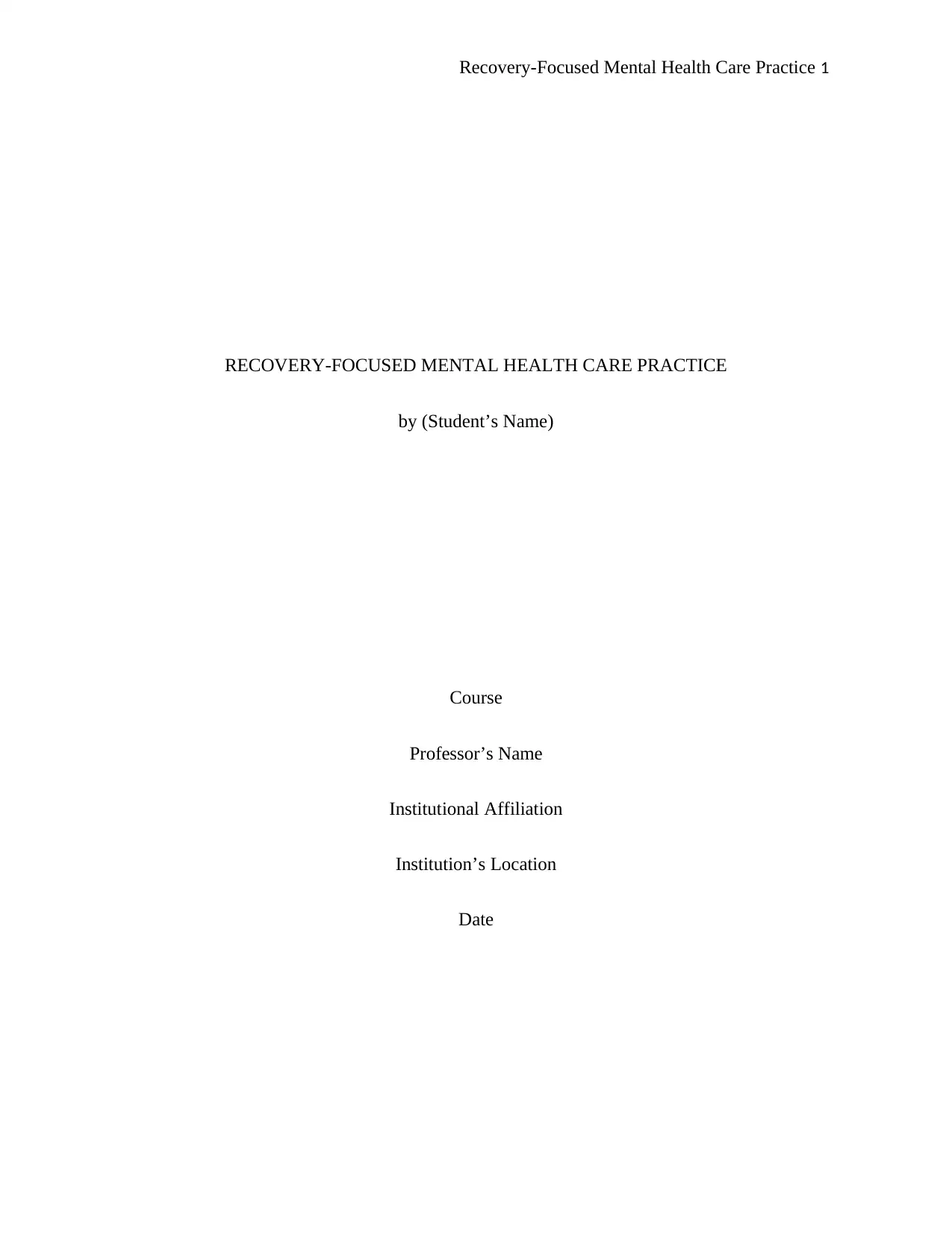
Recovery-Focused Mental Health Care Practice 1
RECOVERY-FOCUSED MENTAL HEALTH CARE PRACTICE
by (Student’s Name)
Course
Professor’s Name
Institutional Affiliation
Institution’s Location
Date
RECOVERY-FOCUSED MENTAL HEALTH CARE PRACTICE
by (Student’s Name)
Course
Professor’s Name
Institutional Affiliation
Institution’s Location
Date
Paraphrase This Document
Need a fresh take? Get an instant paraphrase of this document with our AI Paraphraser
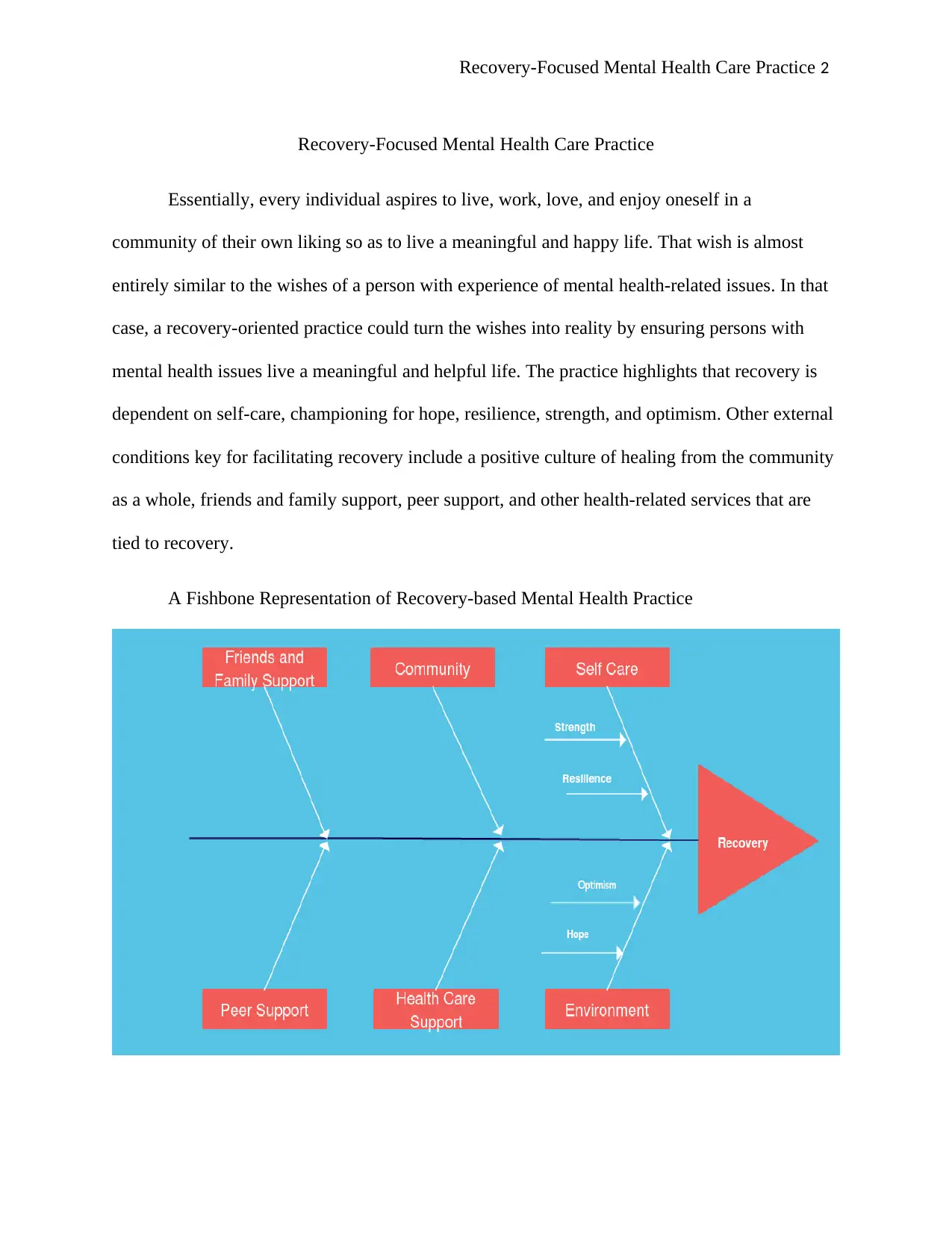
Recovery-Focused Mental Health Care Practice 2
Recovery-Focused Mental Health Care Practice
Essentially, every individual aspires to live, work, love, and enjoy oneself in a
community of their own liking so as to live a meaningful and happy life. That wish is almost
entirely similar to the wishes of a person with experience of mental health-related issues. In that
case, a recovery-oriented practice could turn the wishes into reality by ensuring persons with
mental health issues live a meaningful and helpful life. The practice highlights that recovery is
dependent on self-care, championing for hope, resilience, strength, and optimism. Other external
conditions key for facilitating recovery include a positive culture of healing from the community
as a whole, friends and family support, peer support, and other health-related services that are
tied to recovery.
A Fishbone Representation of Recovery-based Mental Health Practice
Recovery-Focused Mental Health Care Practice
Essentially, every individual aspires to live, work, love, and enjoy oneself in a
community of their own liking so as to live a meaningful and happy life. That wish is almost
entirely similar to the wishes of a person with experience of mental health-related issues. In that
case, a recovery-oriented practice could turn the wishes into reality by ensuring persons with
mental health issues live a meaningful and helpful life. The practice highlights that recovery is
dependent on self-care, championing for hope, resilience, strength, and optimism. Other external
conditions key for facilitating recovery include a positive culture of healing from the community
as a whole, friends and family support, peer support, and other health-related services that are
tied to recovery.
A Fishbone Representation of Recovery-based Mental Health Practice
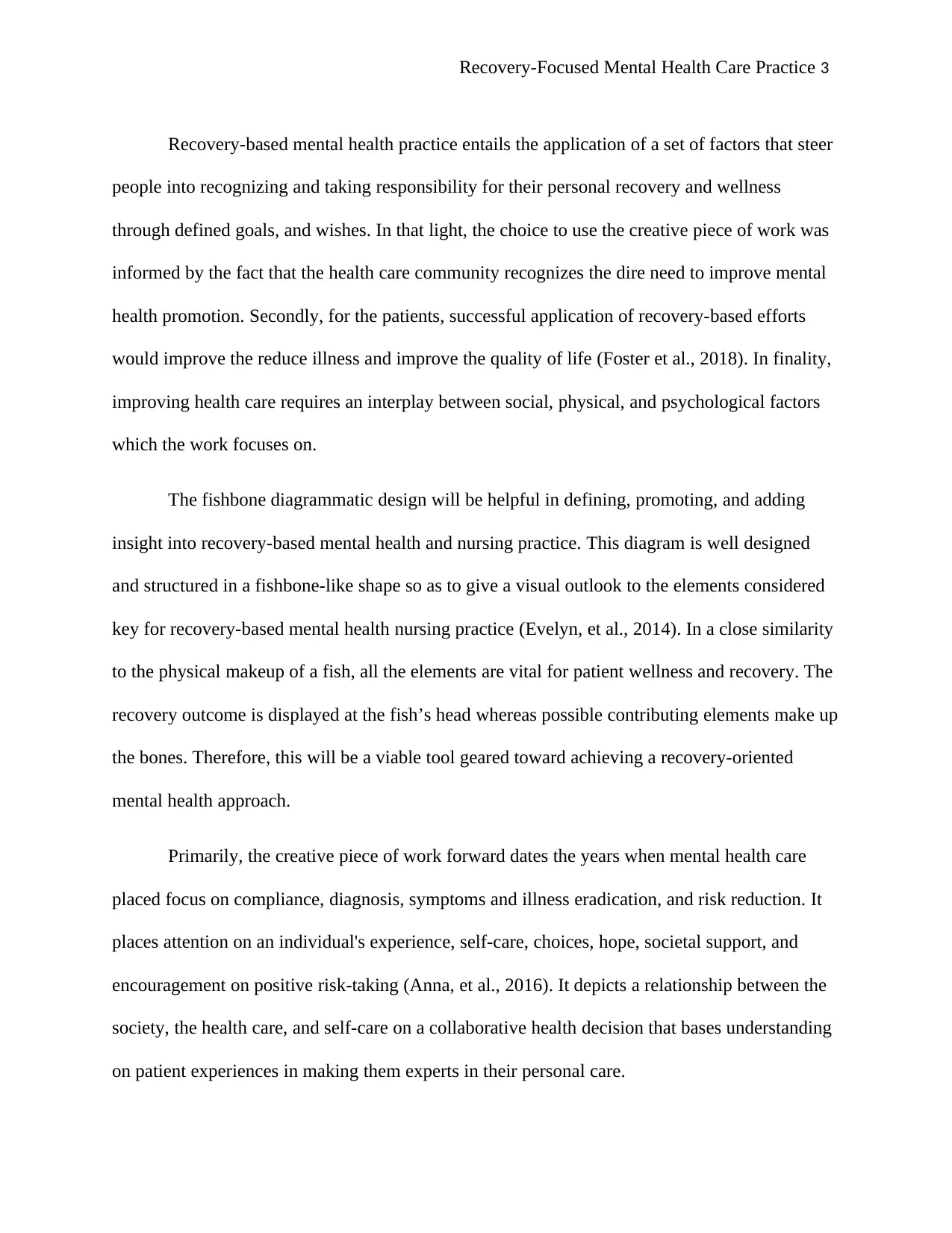
Recovery-Focused Mental Health Care Practice 3
Recovery-based mental health practice entails the application of a set of factors that steer
people into recognizing and taking responsibility for their personal recovery and wellness
through defined goals, and wishes. In that light, the choice to use the creative piece of work was
informed by the fact that the health care community recognizes the dire need to improve mental
health promotion. Secondly, for the patients, successful application of recovery-based efforts
would improve the reduce illness and improve the quality of life (Foster et al., 2018). In finality,
improving health care requires an interplay between social, physical, and psychological factors
which the work focuses on.
The fishbone diagrammatic design will be helpful in defining, promoting, and adding
insight into recovery-based mental health and nursing practice. This diagram is well designed
and structured in a fishbone-like shape so as to give a visual outlook to the elements considered
key for recovery-based mental health nursing practice (Evelyn, et al., 2014). In a close similarity
to the physical makeup of a fish, all the elements are vital for patient wellness and recovery. The
recovery outcome is displayed at the fish’s head whereas possible contributing elements make up
the bones. Therefore, this will be a viable tool geared toward achieving a recovery-oriented
mental health approach.
Primarily, the creative piece of work forward dates the years when mental health care
placed focus on compliance, diagnosis, symptoms and illness eradication, and risk reduction. It
places attention on an individual's experience, self-care, choices, hope, societal support, and
encouragement on positive risk-taking (Anna, et al., 2016). It depicts a relationship between the
society, the health care, and self-care on a collaborative health decision that bases understanding
on patient experiences in making them experts in their personal care.
Recovery-based mental health practice entails the application of a set of factors that steer
people into recognizing and taking responsibility for their personal recovery and wellness
through defined goals, and wishes. In that light, the choice to use the creative piece of work was
informed by the fact that the health care community recognizes the dire need to improve mental
health promotion. Secondly, for the patients, successful application of recovery-based efforts
would improve the reduce illness and improve the quality of life (Foster et al., 2018). In finality,
improving health care requires an interplay between social, physical, and psychological factors
which the work focuses on.
The fishbone diagrammatic design will be helpful in defining, promoting, and adding
insight into recovery-based mental health and nursing practice. This diagram is well designed
and structured in a fishbone-like shape so as to give a visual outlook to the elements considered
key for recovery-based mental health nursing practice (Evelyn, et al., 2014). In a close similarity
to the physical makeup of a fish, all the elements are vital for patient wellness and recovery. The
recovery outcome is displayed at the fish’s head whereas possible contributing elements make up
the bones. Therefore, this will be a viable tool geared toward achieving a recovery-oriented
mental health approach.
Primarily, the creative piece of work forward dates the years when mental health care
placed focus on compliance, diagnosis, symptoms and illness eradication, and risk reduction. It
places attention on an individual's experience, self-care, choices, hope, societal support, and
encouragement on positive risk-taking (Anna, et al., 2016). It depicts a relationship between the
society, the health care, and self-care on a collaborative health decision that bases understanding
on patient experiences in making them experts in their personal care.
⊘ This is a preview!⊘
Do you want full access?
Subscribe today to unlock all pages.

Trusted by 1+ million students worldwide
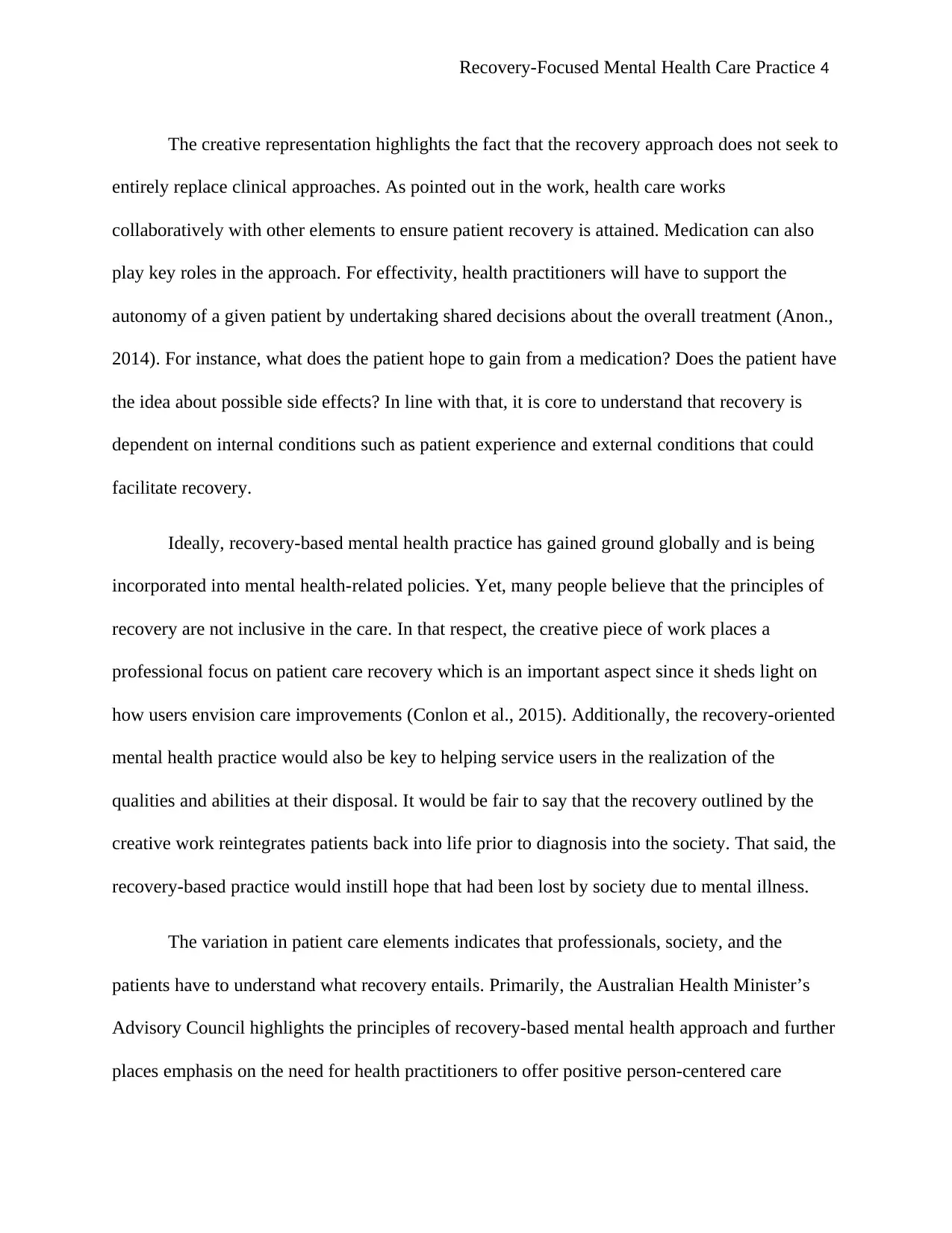
Recovery-Focused Mental Health Care Practice 4
The creative representation highlights the fact that the recovery approach does not seek to
entirely replace clinical approaches. As pointed out in the work, health care works
collaboratively with other elements to ensure patient recovery is attained. Medication can also
play key roles in the approach. For effectivity, health practitioners will have to support the
autonomy of a given patient by undertaking shared decisions about the overall treatment (Anon.,
2014). For instance, what does the patient hope to gain from a medication? Does the patient have
the idea about possible side effects? In line with that, it is core to understand that recovery is
dependent on internal conditions such as patient experience and external conditions that could
facilitate recovery.
Ideally, recovery-based mental health practice has gained ground globally and is being
incorporated into mental health-related policies. Yet, many people believe that the principles of
recovery are not inclusive in the care. In that respect, the creative piece of work places a
professional focus on patient care recovery which is an important aspect since it sheds light on
how users envision care improvements (Conlon et al., 2015). Additionally, the recovery-oriented
mental health practice would also be key to helping service users in the realization of the
qualities and abilities at their disposal. It would be fair to say that the recovery outlined by the
creative work reintegrates patients back into life prior to diagnosis into the society. That said, the
recovery-based practice would instill hope that had been lost by society due to mental illness.
The variation in patient care elements indicates that professionals, society, and the
patients have to understand what recovery entails. Primarily, the Australian Health Minister’s
Advisory Council highlights the principles of recovery-based mental health approach and further
places emphasis on the need for health practitioners to offer positive person-centered care
The creative representation highlights the fact that the recovery approach does not seek to
entirely replace clinical approaches. As pointed out in the work, health care works
collaboratively with other elements to ensure patient recovery is attained. Medication can also
play key roles in the approach. For effectivity, health practitioners will have to support the
autonomy of a given patient by undertaking shared decisions about the overall treatment (Anon.,
2014). For instance, what does the patient hope to gain from a medication? Does the patient have
the idea about possible side effects? In line with that, it is core to understand that recovery is
dependent on internal conditions such as patient experience and external conditions that could
facilitate recovery.
Ideally, recovery-based mental health practice has gained ground globally and is being
incorporated into mental health-related policies. Yet, many people believe that the principles of
recovery are not inclusive in the care. In that respect, the creative piece of work places a
professional focus on patient care recovery which is an important aspect since it sheds light on
how users envision care improvements (Conlon et al., 2015). Additionally, the recovery-oriented
mental health practice would also be key to helping service users in the realization of the
qualities and abilities at their disposal. It would be fair to say that the recovery outlined by the
creative work reintegrates patients back into life prior to diagnosis into the society. That said, the
recovery-based practice would instill hope that had been lost by society due to mental illness.
The variation in patient care elements indicates that professionals, society, and the
patients have to understand what recovery entails. Primarily, the Australian Health Minister’s
Advisory Council highlights the principles of recovery-based mental health approach and further
places emphasis on the need for health practitioners to offer positive person-centered care
Paraphrase This Document
Need a fresh take? Get an instant paraphrase of this document with our AI Paraphraser
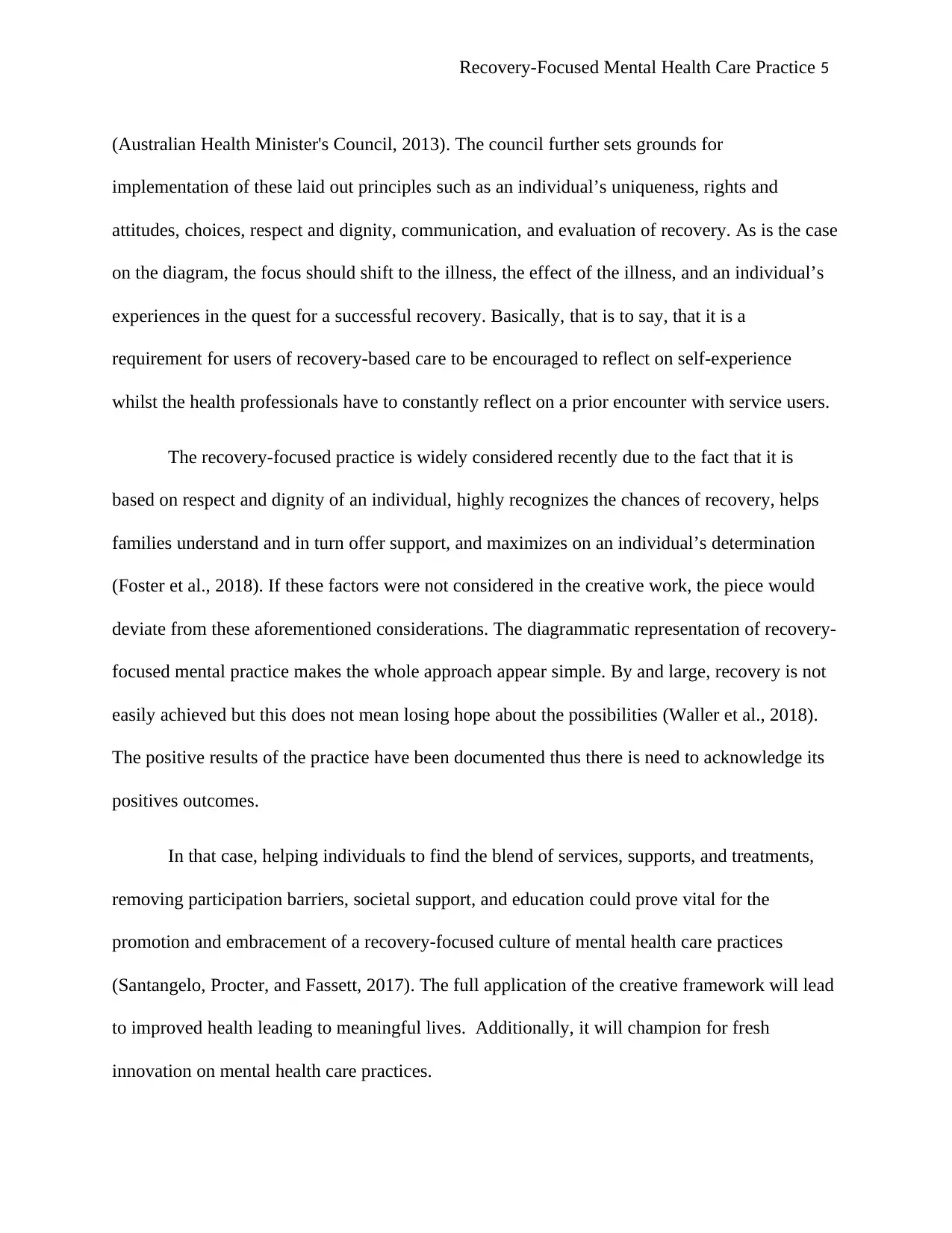
Recovery-Focused Mental Health Care Practice 5
(Australian Health Minister's Council, 2013). The council further sets grounds for
implementation of these laid out principles such as an individual’s uniqueness, rights and
attitudes, choices, respect and dignity, communication, and evaluation of recovery. As is the case
on the diagram, the focus should shift to the illness, the effect of the illness, and an individual’s
experiences in the quest for a successful recovery. Basically, that is to say, that it is a
requirement for users of recovery-based care to be encouraged to reflect on self-experience
whilst the health professionals have to constantly reflect on a prior encounter with service users.
The recovery-focused practice is widely considered recently due to the fact that it is
based on respect and dignity of an individual, highly recognizes the chances of recovery, helps
families understand and in turn offer support, and maximizes on an individual’s determination
(Foster et al., 2018). If these factors were not considered in the creative work, the piece would
deviate from these aforementioned considerations. The diagrammatic representation of recovery-
focused mental practice makes the whole approach appear simple. By and large, recovery is not
easily achieved but this does not mean losing hope about the possibilities (Waller et al., 2018).
The positive results of the practice have been documented thus there is need to acknowledge its
positives outcomes.
In that case, helping individuals to find the blend of services, supports, and treatments,
removing participation barriers, societal support, and education could prove vital for the
promotion and embracement of a recovery-focused culture of mental health care practices
(Santangelo, Procter, and Fassett, 2017). The full application of the creative framework will lead
to improved health leading to meaningful lives. Additionally, it will champion for fresh
innovation on mental health care practices.
(Australian Health Minister's Council, 2013). The council further sets grounds for
implementation of these laid out principles such as an individual’s uniqueness, rights and
attitudes, choices, respect and dignity, communication, and evaluation of recovery. As is the case
on the diagram, the focus should shift to the illness, the effect of the illness, and an individual’s
experiences in the quest for a successful recovery. Basically, that is to say, that it is a
requirement for users of recovery-based care to be encouraged to reflect on self-experience
whilst the health professionals have to constantly reflect on a prior encounter with service users.
The recovery-focused practice is widely considered recently due to the fact that it is
based on respect and dignity of an individual, highly recognizes the chances of recovery, helps
families understand and in turn offer support, and maximizes on an individual’s determination
(Foster et al., 2018). If these factors were not considered in the creative work, the piece would
deviate from these aforementioned considerations. The diagrammatic representation of recovery-
focused mental practice makes the whole approach appear simple. By and large, recovery is not
easily achieved but this does not mean losing hope about the possibilities (Waller et al., 2018).
The positive results of the practice have been documented thus there is need to acknowledge its
positives outcomes.
In that case, helping individuals to find the blend of services, supports, and treatments,
removing participation barriers, societal support, and education could prove vital for the
promotion and embracement of a recovery-focused culture of mental health care practices
(Santangelo, Procter, and Fassett, 2017). The full application of the creative framework will lead
to improved health leading to meaningful lives. Additionally, it will champion for fresh
innovation on mental health care practices.
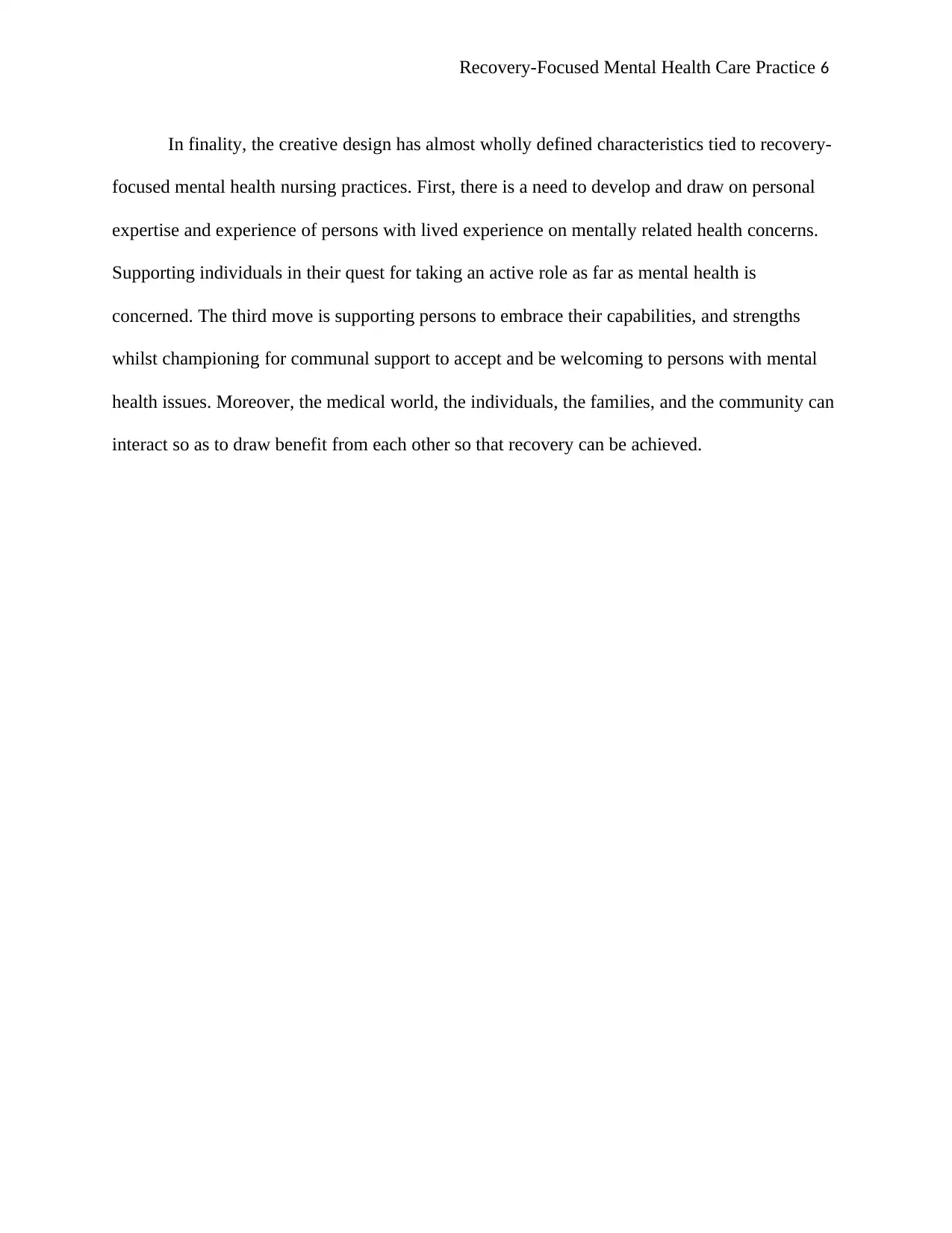
Recovery-Focused Mental Health Care Practice 6
In finality, the creative design has almost wholly defined characteristics tied to recovery-
focused mental health nursing practices. First, there is a need to develop and draw on personal
expertise and experience of persons with lived experience on mentally related health concerns.
Supporting individuals in their quest for taking an active role as far as mental health is
concerned. The third move is supporting persons to embrace their capabilities, and strengths
whilst championing for communal support to accept and be welcoming to persons with mental
health issues. Moreover, the medical world, the individuals, the families, and the community can
interact so as to draw benefit from each other so that recovery can be achieved.
In finality, the creative design has almost wholly defined characteristics tied to recovery-
focused mental health nursing practices. First, there is a need to develop and draw on personal
expertise and experience of persons with lived experience on mentally related health concerns.
Supporting individuals in their quest for taking an active role as far as mental health is
concerned. The third move is supporting persons to embrace their capabilities, and strengths
whilst championing for communal support to accept and be welcoming to persons with mental
health issues. Moreover, the medical world, the individuals, the families, and the community can
interact so as to draw benefit from each other so that recovery can be achieved.
⊘ This is a preview!⊘
Do you want full access?
Subscribe today to unlock all pages.

Trusted by 1+ million students worldwide
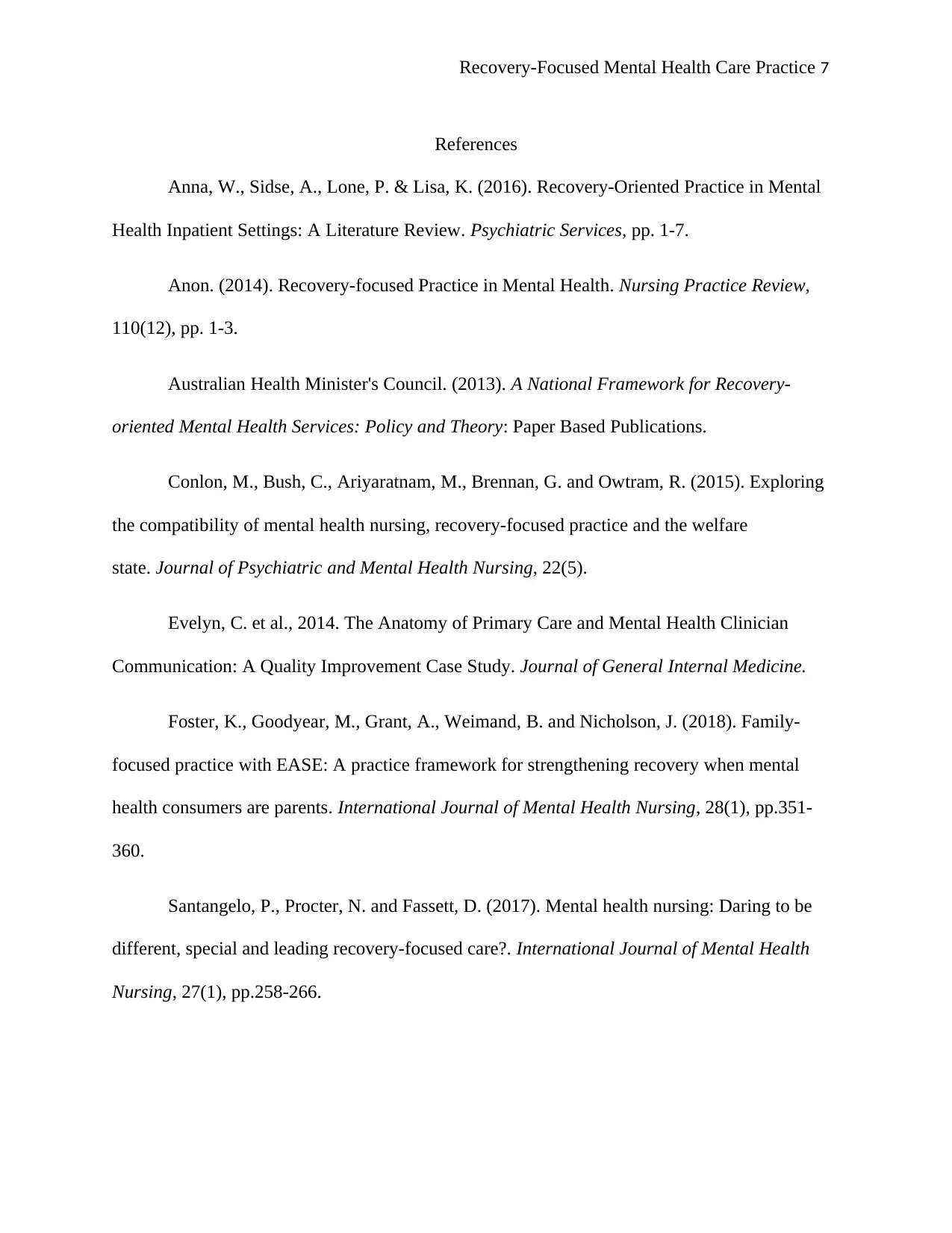
Recovery-Focused Mental Health Care Practice 7
References
Anna, W., Sidse, A., Lone, P. & Lisa, K. (2016). Recovery-Oriented Practice in Mental
Health Inpatient Settings: A Literature Review. Psychiatric Services, pp. 1-7.
Anon. (2014). Recovery-focused Practice in Mental Health. Nursing Practice Review,
110(12), pp. 1-3.
Australian Health Minister's Council. (2013). A National Framework for Recovery-
oriented Mental Health Services: Policy and Theory: Paper Based Publications.
Conlon, M., Bush, C., Ariyaratnam, M., Brennan, G. and Owtram, R. (2015). Exploring
the compatibility of mental health nursing, recovery-focused practice and the welfare
state. Journal of Psychiatric and Mental Health Nursing, 22(5).
Evelyn, C. et al., 2014. The Anatomy of Primary Care and Mental Health Clinician
Communication: A Quality Improvement Case Study. Journal of General Internal Medicine.
Foster, K., Goodyear, M., Grant, A., Weimand, B. and Nicholson, J. (2018). Family-
focused practice with EASE: A practice framework for strengthening recovery when mental
health consumers are parents. International Journal of Mental Health Nursing, 28(1), pp.351-
360.
Santangelo, P., Procter, N. and Fassett, D. (2017). Mental health nursing: Daring to be
different, special and leading recovery-focused care?. International Journal of Mental Health
Nursing, 27(1), pp.258-266.
References
Anna, W., Sidse, A., Lone, P. & Lisa, K. (2016). Recovery-Oriented Practice in Mental
Health Inpatient Settings: A Literature Review. Psychiatric Services, pp. 1-7.
Anon. (2014). Recovery-focused Practice in Mental Health. Nursing Practice Review,
110(12), pp. 1-3.
Australian Health Minister's Council. (2013). A National Framework for Recovery-
oriented Mental Health Services: Policy and Theory: Paper Based Publications.
Conlon, M., Bush, C., Ariyaratnam, M., Brennan, G. and Owtram, R. (2015). Exploring
the compatibility of mental health nursing, recovery-focused practice and the welfare
state. Journal of Psychiatric and Mental Health Nursing, 22(5).
Evelyn, C. et al., 2014. The Anatomy of Primary Care and Mental Health Clinician
Communication: A Quality Improvement Case Study. Journal of General Internal Medicine.
Foster, K., Goodyear, M., Grant, A., Weimand, B. and Nicholson, J. (2018). Family-
focused practice with EASE: A practice framework for strengthening recovery when mental
health consumers are parents. International Journal of Mental Health Nursing, 28(1), pp.351-
360.
Santangelo, P., Procter, N. and Fassett, D. (2017). Mental health nursing: Daring to be
different, special and leading recovery-focused care?. International Journal of Mental Health
Nursing, 27(1), pp.258-266.
Paraphrase This Document
Need a fresh take? Get an instant paraphrase of this document with our AI Paraphraser
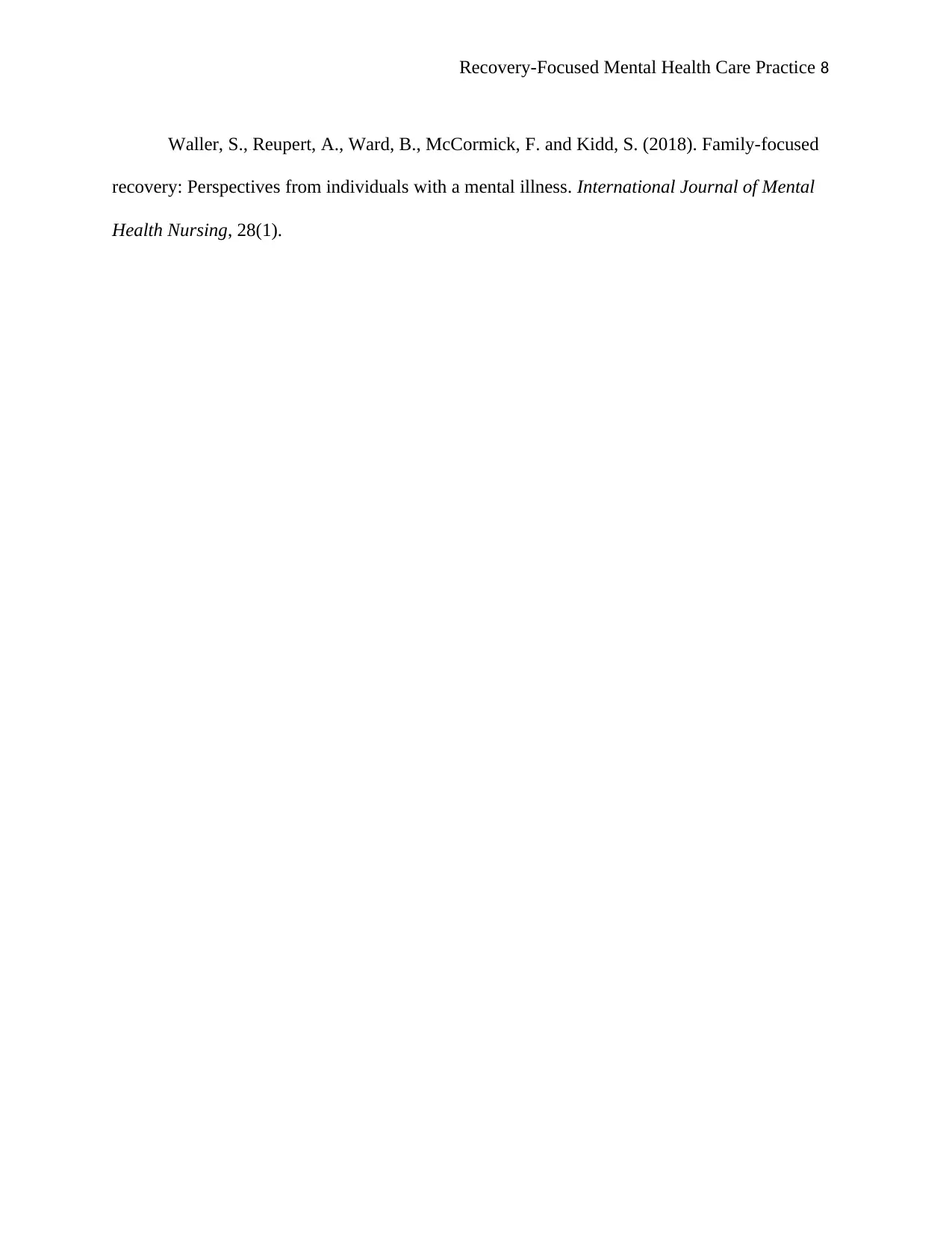
Recovery-Focused Mental Health Care Practice 8
Waller, S., Reupert, A., Ward, B., McCormick, F. and Kidd, S. (2018). Family-focused
recovery: Perspectives from individuals with a mental illness. International Journal of Mental
Health Nursing, 28(1).
Waller, S., Reupert, A., Ward, B., McCormick, F. and Kidd, S. (2018). Family-focused
recovery: Perspectives from individuals with a mental illness. International Journal of Mental
Health Nursing, 28(1).
1 out of 8
Related Documents
Your All-in-One AI-Powered Toolkit for Academic Success.
+13062052269
info@desklib.com
Available 24*7 on WhatsApp / Email
![[object Object]](/_next/static/media/star-bottom.7253800d.svg)
Unlock your academic potential
Copyright © 2020–2026 A2Z Services. All Rights Reserved. Developed and managed by ZUCOL.





